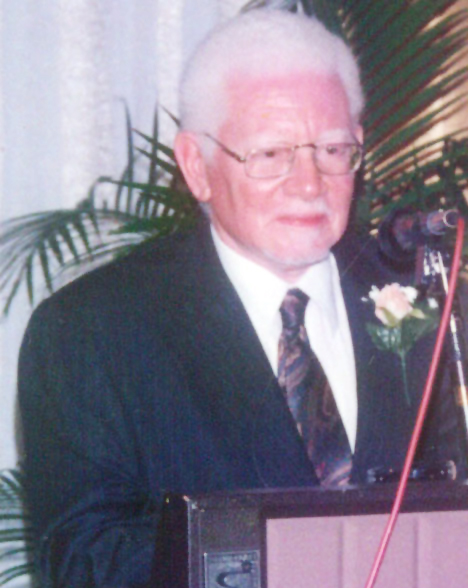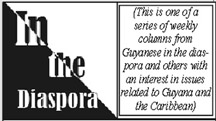From 1957, Moses Bhagwan became active in Guyanese public life and liberation politics through many organizations, including the People’s Progressive Party, the Progressive Youth Organization, The Success Movement, the Indian Political Revolutionary Associates, the Working People’s Alliance and the WPA Overseas Associates. He served as a Member of Parliament from 1961-1968 and was also actively involved in community renewal, sports and religious affairs. Initially a teacher and civil servant, he became an Attorney at Law, practising in the Courts of Guyana since 1970. Moses Bhagwan now resides in New York with his wife Samia, and their two children, Moen and Siddiqui. He is the author of the book Ancestors of the River, and is presently engaged in preparing a selection of his writings in politics and law for publication.
Of Miles Greaves Fitzpatrick I’ll say:
Oh a soul so brightly lit
Cast its light upon the dark
And illumines the myth
And if his great friend our national poet Martin Carter were alive, he would say “too soon. too soon..’
Miles, a man so complete, so gifted with wit, so much in love with literature, poetry, music (jazz), so profoundly political, a sportsman (he played football with the Northern Rangers), an optimist, idealist, and in intimate social settings an enthralling compulsive conversationalist.
He walked with the giants of Caribbean intellectualism, the very best in literature and poetry, revolutionaries of all varieties, eminent social scientists such as CLR James, George Lamming, Jan Carew, Ian McDonald, Andaiye, Eusi Kwayana, Rupert Roopnaraine, Lloyd Best, Clive Thomas, Walter Rodney, and Maurice Bishop.
And I had the honour of being his friend and associate in politics and law.
In law he was the lawyer’s lawyer, a boon to young practitioners, a legal luminary, lucid, incisive, meticulous and thorough and with an expertise in all branches of civil law. Early in his career he won a case before the Privy Council that was decided on an interpretation of sections of the Civil Law Act relating to the reception of English law into Roman Dutch law in the British Colony.
He was the true and fearless leader as President of the Bar Association when he denounced political interference in the judiciary and recommended changes in the constitution to safeguard the integrity of the judiciary and to remove appointment of judges from the intervention of the executive. He also criticized discrimination against women lawyers and the failure to appoint senior counsel from their ranks.
He was tireless in his struggle for legal aid for those who could not afford the costs of litigation. He finally was principally instrumental in setting up a legal aid service. His services were always available to those who were denied civil and constitutional rights and to victims of the executive abuse of power.
Those powers that be that were offended and in retreat from every spear he launched against the system, were vengeful. When he was appointed a judge by the Judicial Service Commission they defied the authority of that body and contrived to abort his swearing in. He was never allowed to take his seat on the bench.
Recognition of his legal eminence and of his embrace of Caribbean revolutionary movements led to his appointment as a legal adviser to and de facto Attorney General of the People’s Revolutionary Government of Grenada, led by Maurice Bishop.
One day a young lawyer just back from London came into the upper flat of Freedom House and introduced himself to me. I was then Secretary of the Education and Research Committee (in which he later served). From the moment he became a member of the People’s Progressive Party (PPP) and Progressive Youth Organisation (PYO), this urbane elegant city resident from a Georgetown middle class background was bold enough to embrace robust working-class politics. He soon became integrated into the mass activist culture and participated at all levels in the organization, appearing at public meetings, speaking to party groups and carrying pickets on the streets, including on one occasion picketing the US embassy for the Bay of Pigs invasion. He went on Thunder (the party weekly publication) promotion campaigns with Paul Christian, Ranji Chandisingh and Patrick Alleyne to the Corentyne, which normally climaxed in jaunts at famous houses in New Amsterdam.
From the beginning we forged a friendship of the purest intimacy, a personal political alliance that passed through and survived decades of endless conflicts and turbulence in the political life of the country. We were always on the same side on many issues which divide. We were in each other’s home frequently and we often ate at the same table. He often raided my wife’s kitchen and praised her baked chicken. He loved good cooking and a good wine and there must have been a chef’s bone in his body.
Miles became active at a restorative period in the organization and added considerably to the diminishing resource of intellectualism, bugbear of the PPP since the departure of Sidney King (as he then was, now Eusi Kwayana), Martin Carter, Rory Westmaas and others. Miles taught Philosophy at Accabre College, the party school. His revolutionary instincts were not a bourgeois aberration but a permanent characteristic of his social being, He was a free spirit above and beyond the constraints of orthodoxy and the full power of his mind and his political culture were in use even after he left the PPP.
He and I still collaborated. He joined the PYO in planning a Caribbean Conference. He brought me into the circle that he and David de Caires had cultivated that led to the birth and impact of the boldly innovative New World Group, which in their associations and broad contacts here and in the Caribbean and through the New World magazine, opened new pathways to revolutionary and transformative political thought and practice and constitutional engineering.
In the New World Guyana Independence issue edited by George Lamming and Martin Carter, Miles and David, both of whom served on the editorial board, wrote a compelling account and analysis: ‘Twenty Years of Politics in our Land.’ Other feature writers in this issue included CLR James, George Lamming, Wilson Harris, Walter Rodney, Eusi Kwayana, Nicholas Guillen, Cheddi Jagan and Lloyd Best. Forbes Burnham wrote the preface.
Twenty Years of Politics opens with these words: “The history of Guyana over the last 20 years is largely a record of the birth, growth and decay of a national movement.” Whoever yearns for a clear understanding of what unfolded in the critical period 1947 to 1967 should consider this compulsory reading.
This creative and enterprising collective of two was deeply concerned with the divisions of the society. From all their initiatives in writing and action you would know that the blood of all races of Guyana flowed in their veins.
Miles paved the way for me to begin my legal education; he introduced me to the Bar after I qualified and nurtured me through the initial stages of my practice. We were associated in a number of political and constitutional cases in the Supreme Court in the resistance to the dictatorial and authoritarian regimes.
Miles was a persuasive force in my political liberation.
After I resigned from the PPP, I took refuge in the friendship and support of Miles and David (with whom Miles had a sustained an unbroken partnership that was not limited to law). Through their magazine they presented a favourable view of the positions of the PYO (of which I was the Chairman) in its conflict with the leadership of the PPP and reported my speeches in Parliament as an Independent member of Parliament. Shortly after, our collaboration yielded the Committee of National Reconstruction which included Miles Fitzpatrick, David de Caires, Dr. Harold Drayton, Rickey Singh, Clairmonte Josiah, LSH Singh, Albert Gibbs, Lancelot McCaskey and myself and others.
As we moved on to newer forms of political organizations, Miles remained stoutly supportive and that allegiance carried over to the ‘civil rebellion’ in which the Working People’s Alliance, with Walter Rodney, as its de facto leader played a principal role.
And of course I have not forgotten their crowning achievement in an immense contribution to journalism and an independent press in the launching of Stabroek News.
I was fortunate to meet him and Ziddi at their home on my visit to Guyana in September 2016. As expected we discussed his domestic situation, his legal practice and the political situation. Even then he was accommodating at his home political activists or potential political activists who were searching for new solutions to the deepening crisis in Guyana.
My family and I share the grief of Ziddi, Garry and their family and friends who mourn his loss and celebrate his magnificent accomplishments, his emphatic and inspirational presence and his selfless service to the people of Guyana, in so many ways.






